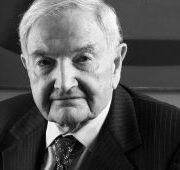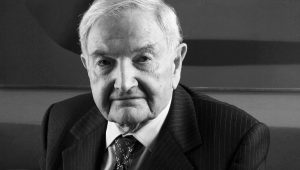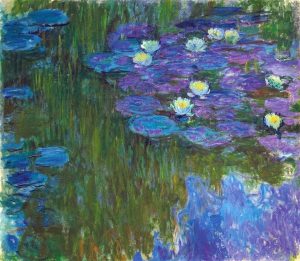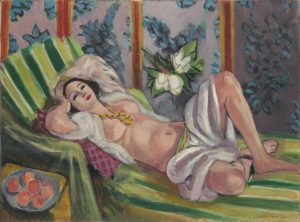Farewell to David Rockefeller
Watching Sotheby's sell off the possessions of David Rockefeller, the memories came flooding back.
A Picasso went for a staggering $115 million, while a Monet fetched $80 million. A leather easy chair estimated at $300 sold for $8,000.
I've seen then all, either at the downtown headquarters of Chase Manhattan Bank, which Rockefeller turned into an art museum, or at dinner parties at his posh Upper East Side mansion.
I was sitting across the desk from Bob Baldwin, the chairman of Morgan Stanley. It was 1982, and I was 30 years old.
He carefully studied my resume in his hand. Then he picked up the phone and hit a button on speed dial to call David Rockefeller.
Rockefeller, the chairman of Chase Manhattan Bank, picked up.
Baldwin said, "I have a John Thomas sitting in front of me." He paused a second, and then hung up.
"He says you're alright," and Bob offered me a job on the spot to get the firm into the international equity business.
That's how I started a long and illustrious career at Morgan Stanley.
I eventually became one of the most successful traders in the company, and at one point accounted for 80% of equity division profits.
It is also where I learned the knowledge that I am passing on to you today through the Diary of a Mad Hedge Fund Trader and my trade mentoring service.
I have David Rockefeller to thank for getting me started.
So, it was with a heavy heart that I learned that he passed away recently at the ripe old age of 101.
Rockefeller was the youngest grandson of oil baron John D. Rockefeller, the founder of the Standard Oil Company. The modern-day spin-offs include ExxonMobil, Chevron, Amoco, and parts of British Petroleum.
The Sherman Antitrust Act was passed specifically to break up Rockefeller's oil refining monopoly.
Rockefeller was America's first billionaire.
Rockefeller could have had an easy life of moneyed leisure in high society.
He chose otherwise.
He grew up in a Manhattan 54th Street mansion attended by armies of nannies and servants, where his parents dressed black tie for dinner every night.
He remembers his doting grandfather, John D., who only gave him dimes "to keep us thrifty."
His mother founded the New York Museum of Modern Art in 1929, for which Rockefeller became chairman in later years.
He took the trouble to get a PhD in Economics from the University of Chicago in 1940, supporting Franklin Delano Roosevelt's deficit spending to end the Great Depression.
The family was horrified, as FDR's 90% maximum tax rate substantially whittled down the family's fortune by the time John Kennedy repealed it in 1962.
I got to know David Rockefeller well during the 1970s when I covered U.S. banking for The Economist magazine, and he spearheaded Chase Manhattan Bank's aggressive international expansion.
Rockefeller became the unofficial ambassador for the brash, unvarnished capitalism of the day. He wreaked establishment.
For a decade, whenever I interviewed major world leaders, such as Zhou Enlai of China, Ferdinand Marcos of the Philippines, Emperor Hirohito of Japan, or Margaret Thatcher of Great Britain, I would often bump into Rockefeller on the way out.
It was a bygone era, when major clients were courted primarily through the social register.
Eventually, international business came to account for 80% of Chase Manhattan's total profits.
It is perhaps fitting that Rockefeller was an early supporter of the construction of the original World Trade Center in downtown Manhattan, just walking distance from his bank.
I used to meet Rockefeller in his cavernous office on the 65th floor of the Chase Manhattan building near Wall Street. He sat behind a polished hardwood desk the size of Montana.
Also known for his immense art collection, almost every floor of the building was decorated with favorite pieces from his personal collection. There was even a Chagall on the way to the men's room.
In perhaps the greatest compliment every paid me, he told me he had 70,000 names in his Rolodex, and I was one of them.
Wow! To be in David Rockefeller's Rolodex! Did you get that mom?
Rockefeller was always charming and gracious to a T. He was the guy who was friendly to everyone, with a great sense of humor, even when he didn't have to be.
He was offered the post of U.S. Treasury Secretary by multiple administrations and turned them down every time. He preferred to spend more time on his prized collection of beetles instead, the largest in the world.
He worked well into his 90s and maintained an office on the 56th floor at Rockefeller Center, which his father had built to create jobs in New York during the Great Depression.
Because I was one of a handful of Morgan Stanley officers who spoke fluent Japanese, I was recruited to the team that sold Rockefeller Center to the Japanese for $1.3 billion in 1989. It was one of the largest real estate transactions in history at that time.
The last time I saw Rockefeller was at a gala black tie event for his 90th birthday at the Museum of Modern Art, where tables were selling for $90,000 a piece.
Rockefeller used the event to announce a staggering $100 million gift to the museum.
So, thank you David Rockefeller for all your help, and a life well lived.
They don't make them like you anymore.
You will be missed.





